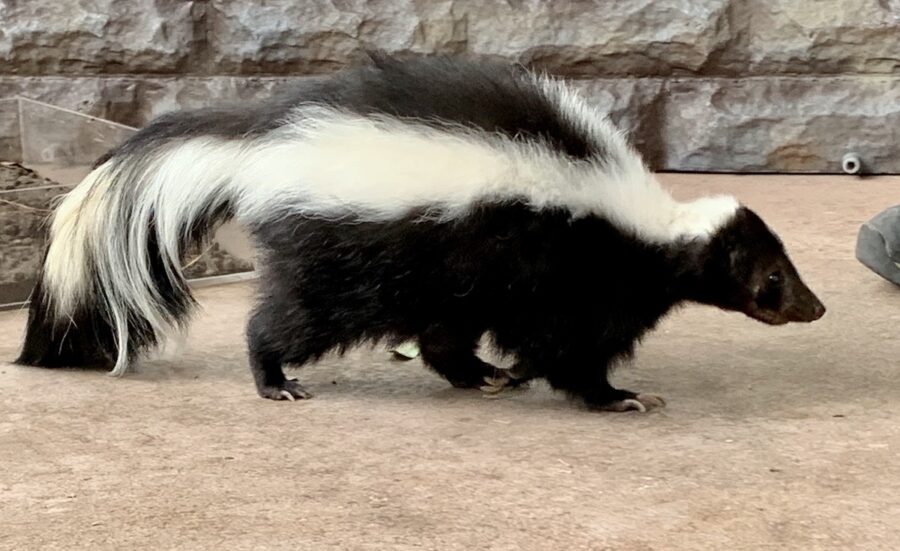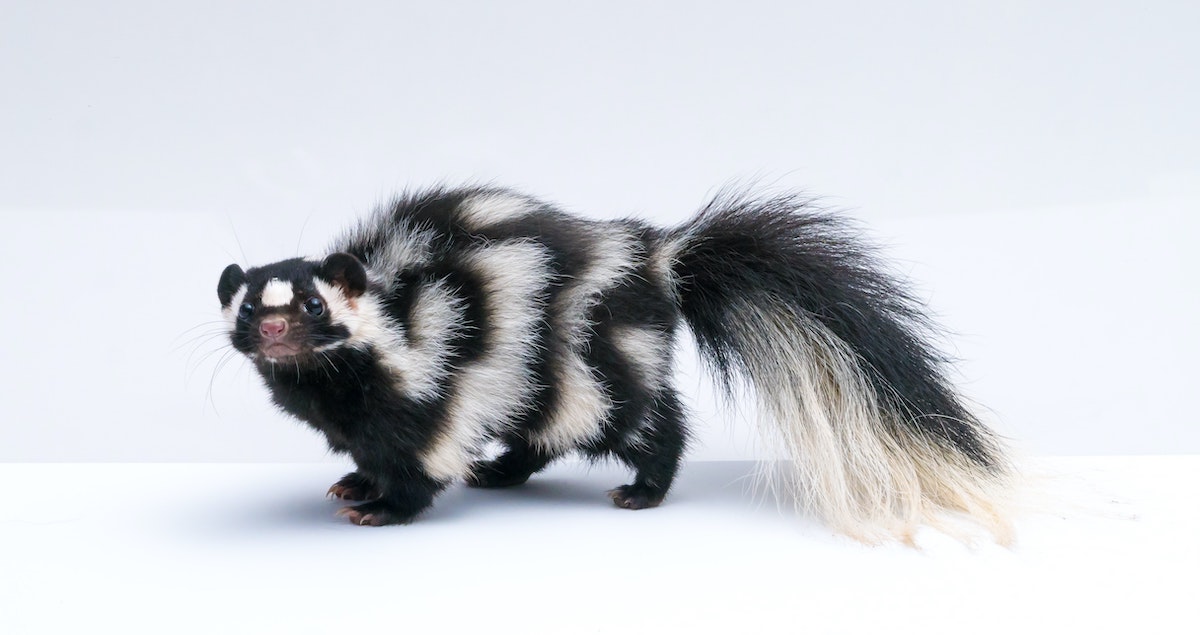Skunks are kind of cute – when they keep their distance. These nocturnal mammals can become a bother when they explore gardens or get into scraps with your pet (ever tried washing a dog after they got skunked?). They can also pinch your prize produce while you sleep. If you suspect that your property is in the crosshairs of a skunk family, don’t fret. There are ways to humanely show them the door!
Table of Contents
1. Resist the Urge to Feed Them
As nature lovers, we like to feed birds and other animals. There is nothing wrong with that, especially during the winter when their natural food sources become scarce and they risk starvation.
But if you have a problematic skunk, then you need to make a hard decision and that is to stop feeding it. For the time being, you might even have to stop feeding the other animals as well. Skunks make no distinction between “their food” and something you left specifically for foxes or deer.
2. Secure Your Outdoor Trash
If you are not feeding a skunk on purpose, you might be doing so accidentally! The main reason skunks meander into properties is because they are either searching for dinner or have found some food in your garden before.
A couple of fast food joints for skunks include the trash can, compost heap and other waste setups. Make sure that your refuge bin has a lid that can be securely locked at night. Spraying the can with something that masks food odors will also help to keep the bin off a skunk’s radar. If you have an open compost situation, rather transfer everything to a compost bin that can be skunk-proofed in a similar way to your trash.
3. Remove Other Organic Matter
Any garden has organic matter but some properties offer tasty bits that a skunk cannot resist. Do you have trees that drop fruit? Those need to be picked up before nightfall (keep in mind that even though skunks are nocturnal, they are not above scrounging for food during the day). Remove pet food and stop adding fruit and veggies to your bird feeder for the time being.
4. They Hate That Spotlight

Skunks are skittish by nature. They prefer nighttime visits because the dark makes them feel less exposed. Many homeowners have had success with motion-activated spotlights to scare these critters off. As a bonus, the light will also add extra security to your property!
5. Fight Them With Odors
Ironic but true. One of the smelliest mammals on the planet hates certain aromas. If this is something that interests you, keep in mind that some of the suggestions online are unsafe. Things like mothballs and ammonia-soaked cotton balls can keep skunks away but they can also end up harming your garden, pets and children.
Safe products are available and one of them is predator urine (or synthetic predator urine). Skunks are also not fond of citrus smells, so grab a non-toxic lemon spray and get to work! You can even sprinkle orange or lemon peels around the garden.
6. Fence Your Pond
Skunks also view ponds as a good resource. After all, what’s better than quenching your thirst at a koi pond after you have raided the veggie garden, right? Skunks are not great climbers, so a short fence will do.
However, you never know how determined the animal might be. Play it safe and erect a fence that is at least waist-high. This needn’t be a permanent feature. Once the skunk moves on to another place, you can take down the enclosure.
7. Protect Your Vegetable Garden

Many skunks are drawn to veggie gardens – and with good reason. There is plenty to eat! Similar to your pond, the best option is to fence it off. You can secure it with wood panels or wire fencing but either way, make sure that it is high enough so that the skunk cannot clamber over the top.
Remember, skunks are expert diggers. Make sure that the fencing around your pond or vegetable garden does not just sit on the ground’s surface, it needs to sink down a couple of feet into the earth.
8. Create Squash Barriers
This is a particularly interesting option. Skunks like to munch on squash but most of them will avoid walking through or over the plants. The leaves of a squash plant have tiny hairs that irritate a skunk’s paws.
You can create lush squash barriers around your vegetable garden or along the fence border of your entire property. Not only will this hedge discourage skunks but when the time is right, you harvest plenty of squash!
Top Tip: Two tasty options include zucchini and pattypan squash.
9. Kick Things Up a Notch With Nettles
Did that skunk stroll over the squash like a boss? Then it is time to replace the vegetables with stinging nettles. Any animal will quickly learn to avoid this type of hedge because it produces an uncomfortable burning sensation when touched. Just make sure that your own pets and kids do not get zinged by the nettles!
10. Tackle Your Garden’s Insect Problem
Skunks love to forage for bugs, worms, amphibians, and insects. If you don’t have a veggie garden, fruit trees or pet food outside, then skunks could be visiting your property for the creepy crawlies. Use a non-toxic pesticide or deterrent to bring any problem populations under control. This will remove the skunk’s reason for visiting.
11. Spray Them Back

There are two benefits to a water sprinkler system that is motion-activated. They can make a skunk’s visit so uncomfortable that eventually, it might decide to never return. This harmless tactic is not just an effective skunk deterrent but when placed near your veggie patch, the water certainly won’t be wasted.
12. Use a Humane Animal Expert
When all else fails, you can contact an animal removal company to deal with your skunk problem. However, do your due diligence. There are too many dodgy removers that will harm or kill the animals which is unnecessarily cruel.
Only use a company that guarantees a humane approach (they normally catch the animals on your property and release them elsewhere in a suitable environment). Also, look for companies that receive plenty of positive reviews.
FAQ

Q: Can I trap skunks myself in order to release them somewhere else?
Yes, you can trap skunks yourself. However, it is advisable to contact a human expert to catch and release the skunk. They will know when to catch the animal (in order to prevent removing a nursing female and leaving her babies to starve without her). They will also know how to trap the animal safely and how to handle it without getting sprayed!
Q: Can I fill up a skunk’s den to encourage them to move away?
Yes, you can and this is an effective way to get skunks to move on. But once again, you need to make sure that you do this humanely, so do not fill up dens during the time when skunks are giving birth and raising families. You can accidentally fill up a den that is full of babies. Most are born in May or June and they need their shelter for 8 weeks.
Q: Can skunks be kept as pets?
When you have experience with skunks, they do make good pets. It is also currently legal in the US to keep a domesticated skunk but only in the following states – Alabama, Florida, Indiana, Iowa, Massachusetts, Michigan, New Hampshire, New Jersey, New Mexico, Ohio, Oklahoma, Oregon, Pennsylvania, South Dakota, West Virginia, Wisconsin, and Wyoming.
Q: Can I get a dog to scare off skunks?
This is not the best solution. Both animals are capable of causing the other harm. A dog might also kill a female with a nest of babies waiting for her. With all the humane options available, including professional trappers, getting a dog purely to scare skunks is not the way to go.
Q: How long do skunks live?
A skunk can live as long as some dog breeds. In the wild, they can reach the age of 7 years. As pets, they get a few extra years and have been known to reach 10.
Q: Are skunks good for anything?
Yes, skunks are scavengers that eat carrion. This helps the environment get rid of carcasses. They also consume pests like mice, crickets and wasps.

